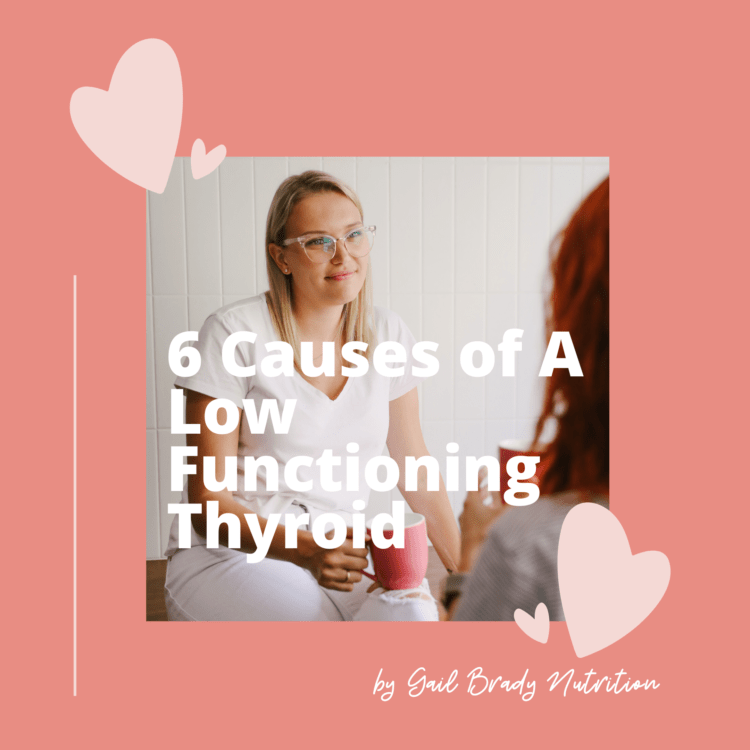
Many women develop issues with their thyroid gland in midlife. The most common of which is an underactive thyroid.
So what is the thyroid? and why does it matter?
The thyroid gland is a butterfly-shaped gland in your neck.
It is responsible for your metabolism. That means that it determines the rate at which your burn energy (calories) from food, how easy it is for you to lose weight, how much energy you have as well as your body temperature.
It is also responsible for the repair of all cells in your body, your mood, your cognitive function and your hormones.
You can have an underactive (hypo) or an overactive (hyper) thyroid but a hypothyroid is by far the most common including the autoimmune condition Hashimoto’s thyroiditis.
Hypothyroidism means that you are not producing enough active thyroid hormones and your body slows down. Your heart rate, your circulation, your energy, your body temperature, your gut, your metabolism, all slow down.
Common signs and symptoms of low thyroid function
-
Fatigue and low energy
-
Weight gain or an inability to lose weight
-
Hair loss (including the thinning of the outer 3rd of the eyebrows and thinning eyelashes)
-
Dry skin and hair
-
Cold hands and feet/ and sensitivity to the cold
-
Constipation
-
High cholesterol
-
PMS/Mood swings
-
Depression and Anxiety
-
Brittle nails
-
Joint aches and pains
-
A heart rate less than 60bpm
-
Brain fog and poor concentration
-
Hoarse voice
-
Low sex drive
-
A family history
You also need to know is that low thyroid function without autoimmunity is almost always caused by something else.
Here are 6 reasons you may be experiencing low thyroid function
1. You are experiencing chronic emotional or mental Stress
2. You have hormone imbalances such as oestrogen dominance or low
progesterone which is common in perimenopause.
progesterone which is common in perimenopause.
3. You have Inflammation in the body.
4. You have imbalances in the beneficial bacteria in your gut or compromised gut health
5. You are being, or have been exposed to environmental toxins
6. Nutrient deficiencies are affecting your thyroid gland’s ability to produce adequate amounts of hormones.
Here are some key nutrients needed for thyroid health
Vitamin D is needed for optimal TSH levels
The mineral Iodine is also needed to regulate TSH (in small amounts)
Vitamin A is needed to make the inactive form of thyroid hormone (T4)
Iron is needed to convert inactive thyroid hormones into the active form
B vitamins regulate hormones and support detoxification
The thyroid also needs selenium, zinc and magnesium.
A good quality multivitamin and mineral supplement can often cover all of these
Testing
If you have visited your health care provided for testing, you should be aware that testing in conventional medicine often only looks at thyroid-stimulating hormone (TSH) and Thyroxine (T4 only. And unfortunately, these markers often do not give the full picture. Here is why…
TSH sends the signal to the body to produce more thyroid hormones. If your TSH is high it can mean that the message is not getting through and something is blocking it.
Free T4 is an inactive form of thyroid hormone. It is almost like a storage hormone that your body should convert to the active form (T3) as and when it is needed.
Free T3 is this active form of thyroid hormone. Certain nutrients and conditions need to be right for your body to convert T4 into T3. T3 is quite potent but has a very short life within your body.
However, reverse T3 (rT3) is also an inactive form of thyroid hormone. This can be produced by your body when it wants to conserve energy. This could be due to illness, prolonged stress, nutrient deficiencies or inflammation.
This is where testing comes in. Instead of guesswork, we can use testing to find out which thyroid hormones you are or are not producing. We can find out if you are converting T4 to the active hormone T3 and if you have antibodies present which could indicate autoimmunity.
Find out more
I offer blood testing which includes all of the above. If you think that your thyroid could be an issue for you, contact me if you would like to find out more about hormone testing packages 




